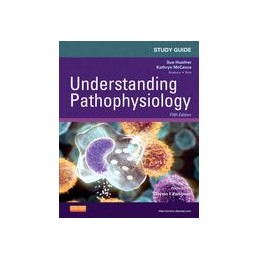- Obniżka


 Dostawa
Dostawa
Wybierz Paczkomat Inpost, Orlen Paczkę, DHL, DPD, Pocztę, email (dla ebooków). Kliknij po więcej
 Płatność
Płatność
Zapłać szybkim przelewem, kartą płatniczą lub za pobraniem. Kliknij po więcej szczegółów
 Zwroty
Zwroty
Jeżeli jesteś konsumentem możesz zwrócić towar w ciągu 14 dni*. Kliknij po więcej szczegółów
Designed to be used in tandem with the Understanding Pathophysiology, 5th Edition textbook, this study guide provides an in-depth review of the most important pathophysiology facts and information. Learning objectives, Memory Check! boxes, and practice examinations for each chapter hone your understanding and help you review key concepts from the text. This edition also features a greater variety in exercises and more case study questions for further analysis. Answers to the practice examinations and a discussion of each case study question can be found in the back of the study guide.
Opis
Introduction to Pathophysiology
PART ONE: BASIC CONCEPTS OF PATHOPHYSIOLOGY
Unit 1: The Cell
1. Cellular Biology
2. Genes and Genetic Diseases
3. Altered Cellular and Tissue Biology
4. Fluids and Electrolytes, Acids and Bases
Unit 2: Mechanisms of Self-Defense
5. Innate Immunity: Inflammation and Wound Healing
6. Adaptive Immunity
7. Infection and Defects in Mechanisms of Defense
8. Stress and Disease
Unit 3: Cellular Proliferation: Cancer
9. Biology, Clinical Manifestations, and Treatment of Cancer
10. Cancer Epidemiology
11. Cancer in Children
PART TWO: BODY SYSTEMS AND DISEASES
Unit 4: The Neurologic System
12. Structure and Function of the Neurologic System
13. Pain, Temperature, Sleep, and Sensory Function
14. Alterations in Cognitive Systems, Cerebral Hemodynamics and Motor Function
15. Disorders of the Central and Peripheral Nervous Systems and the Neuromuscular Junction
16. Alterations of Neurologic Function in Children
Unit 5: The Endocrine System
17. Mechanisms of Hormonal Regulation
18. Alterations of Hormonal Regulation
Unit 6: The Hematologic System
19. Structure and Function of the Hematologic System
20. Alterations of Hematologic Function
21. Alterations of Hematologic Function in Children
Unit 7: The Cardiovascular and Lymphatic Systems
22. Structure and Function of the Cardiovascular and Lymphatic Systems
23. Alterations of Cardiovascular Function
24. Alterations of Cardiovascular Function in Children
Unit 8: The Pulmonary System
25. Structure and Function of the Pulmonary System
26. Alterations of Pulmonary
27. Alterations of Pulmonary Function in Children
Unit 9: The Renal and Urologic Systems
28. Structure and Function of the Renal and Urologic Systems
29. Alterations of Renal and Urinary Tract Function
30. Alterations of Renal and Urinary Tract Function in Children
Unit 10: The Reproductive Systems
31. Structure and Function of the Reproductive Systems
32. Alterations of the Reproductive Systems Including Sexually Transmitted Infections
Unit 11: The Digestive System
33. Structure and Function of the Digestive System
34. Alterations of Digestive Function
35. Alterations of Digestive Function in Children
Unit 12: The Musculoskeletal and Integumentary Systems
36. Structure and Function of the Musculoskeletal System
37. Alterations of Musculoskeletal Function
38. Alterations of Musculoskeletal Function in Children
39. Structure, Function, and Disorders of the Integument
40. Alterations of the Integument in Children
Indeks: 47463
Autor: JoAnn Zerwekh
Visual, Mnemonic, and Memory Aids for Nurses
